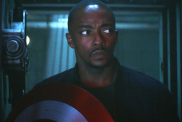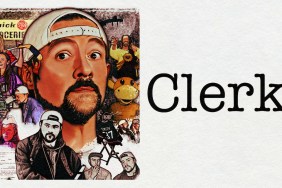
The Last Metro was released 21 years after The 400 Blows and was shot in color and became Truffaut’s biggest commercial success. When compared to 400 Blows the success of this film is easily understandable as it is far more accessible. The Last Metro is set during the World War II German occupation of Paris in 1942 and centers on a French theater company as theater performances became one of the #1 sources of entertainment in those trying days. Taking place at the Theatre Montmartre there is a constant tension in the air as Jewish theater owner Lucas Steiner (Heinz Bennet) has fled the country leaving his wife Marion (Catherine Deneuve) in charge as she begins work on a new play written by her husband with a new star in Bernard Granger (Gerard Depardieu) joining the company as the lead in what will be an adaptation of “The Vanished Woman.”
From a visual perspective this film is just as impressive in color as 400 Blows is in black-and-white and the high-definition transfer is pristine. Nestor Almendros was the film’s director of photography and for anyone that has ever seen Terrence Malick’s Days of Heaven you already know what you are in for. This film is beautiful with deep reds and several scenes lit by candlelight alone adding to the ambiance. Watching it I instantly began thinking of the work Sven Nykvist put in on Ingmar Bergman’s Fanny and Alexander and more recently the Oscar-nominated work of Roger Deakins and Chris Menges in The Reader.

Next comes a 15 minute feature titled “Performing The Last Metro“, which includes interviews with such actors as Sabine Haudepin (Nadine Marsac), Paullette Dubost (Germaine Fabre) and Andrea Ferreol (Arlette Guillaume) as well as Alain Tasma who played the small role of Marc and served as the second assistant director. The best part of this feature is a short segment in which Tasma talks of Truffaut’s technique and approach to cinema as an illusion and how Truffaut realized the director doesn’t need to ask the actors to feel anything. Tasma says, “He knew that this shot, edited with this dialogue and this gesture will feel real.” The example shown involving Deneuve and the direction described serves as an outstanding representation and it really speaks to the talent Truffaut had and his complete understanding of cinema.
Much like The 400 Blows this disc includes interview excerpts from a variety of sources including “Les nouveaux rendez-vous” in which Truffaut, Deneuve and Depardieu are interviewed on the French television show and the same goes for “Pasez donc me voir” which is with Truffaut and actor Jean Poiret.
This release also includes two audio commentaries, the first is a Criterion exclusive with film scholar and author of “François Truffaut” Annette Insdorf and the second is a moderated French commentary with actor Gerard Depardieu and historian Jean-Pierre Azema. Insdorf’s commentary is a step up from the audio essay style commentary found on The 400 Blows as her speaking style is much easier to listen to and the commentary with Depardieu and Azema is more of a feature length interview that is also quite entertaining with plenty of great tidbits from the outset which includes Depardieu’s recollection of his first meeting with Truffaut.
Finally there is one deleted scene and an included 1958 short titled Une Histoire D’eau (A Story of Water), which was directed by Jean-Luc Goddard and Truffaut and is described as reveling “in the playfulness and pure joy of filmmaking that would mark all of Truffaut’s work.”
The main thing I took away from watching these two films and their included supplemental material is a quote Truffaut gave in one of the interview segments on The Last Metro when the interviewer mentioned how the film repeated a few of the themes from the director’s earlier films. “You can’t make anything that’s 100% new,” Truffaut said. This is a statement you may look at as obvious and not particularly worthy of note, but it is a statement I respect especially coming from Truffaut. Based on his obvious knowledge of cinema and its history it is a statement that speaks to his understanding of why something will be interesting to an audience. He knew he was telling a story that had already been told and it was that admitted realization that allowed him to shape his stories into something the audience would come away with as a new experience.
It’s no secret there are no original stories left to tell and it is why you can watch so many generic Hollywood pictures and know exactly what path the story is going to take on its way to its finale. However, if a director realizes their story is not wholly original and is willing to admit it, they suddenly gain the upperhand on their audience and are able to look at it form a different perspective. They are able to look at the film as an outsider and as a filmgoer. They can see the turn in the road before they get to it and can decide to follow it or create a new path once they get there in an effort to lead the audience down a road slightly less traveled and therefore unexpected.
In looking at these two films I would say 400 Blows certainly supplies more twists and turns than The Last Metro, which is a fact-based fiction that really only has one direction to go, but Truffaut’s willingness to play with themes such as homosexuality in Last Metro still allows for a couple of turns the audience isn’t fully expecting which combines for some powerful storytelling.
I would recommend adding both of these titles to your film collection and I think any kind of cinephile that already owns The 400 Blows will kick themselves if they don’t upgrade to what is certainly a superior transfer to the original Criterion DVD release. After only seeing three of Truffaut’s films I am instantly attracted to his features as well as the man himself. I only want to learn more and these two films and their supplemental material are perfect starting points.
For buying information on The 400 Blows and The Last Metro click here. The Last Metro is also being released on two-disc Criterion DVD.










